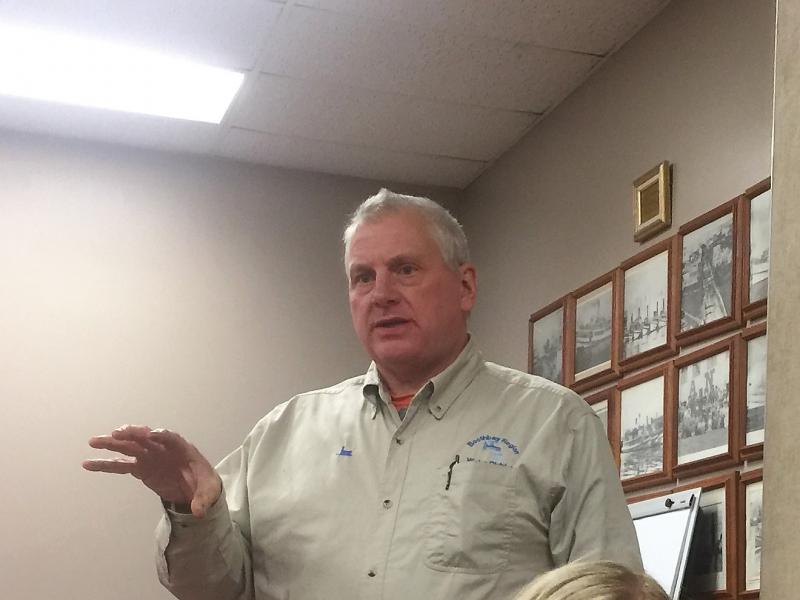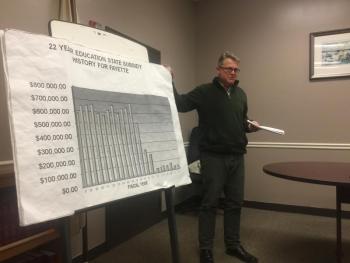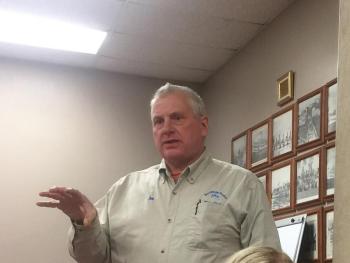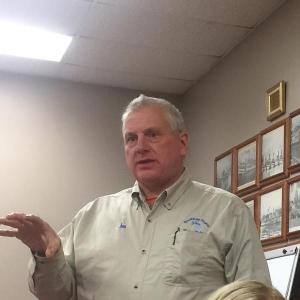Fayette manager wants CSD, towns to help “Raise the Floor”
 Fayette Town Manager Mark Robinson wants all minimum receivership districts to jump on board with asking Maine to “Raise the Floor.” JOSEPH CHARPENTIER/Boothbay Register
Fayette Town Manager Mark Robinson wants all minimum receivership districts to jump on board with asking Maine to “Raise the Floor.” JOSEPH CHARPENTIER/Boothbay Register
 Boothbay Region Water District General Manager Jon Ziegra explains Boothbay Harbor’s hydrant rate increase of $163,000. JOSEPH CHARPENTIER/Boothbay Register
Boothbay Region Water District General Manager Jon Ziegra explains Boothbay Harbor’s hydrant rate increase of $163,000. JOSEPH CHARPENTIER/Boothbay Register
 Fayette Town Manager Mark Robinson wants all minimum receivership districts to jump on board with asking Maine to “Raise the Floor.” JOSEPH CHARPENTIER/Boothbay Register
Fayette Town Manager Mark Robinson wants all minimum receivership districts to jump on board with asking Maine to “Raise the Floor.” JOSEPH CHARPENTIER/Boothbay Register
 Boothbay Region Water District General Manager Jon Ziegra explains Boothbay Harbor’s hydrant rate increase of $163,000. JOSEPH CHARPENTIER/Boothbay Register
Boothbay Region Water District General Manager Jon Ziegra explains Boothbay Harbor’s hydrant rate increase of $163,000. JOSEPH CHARPENTIER/Boothbay Register
Fayette Town Manager Mark Robinson told Boothbay Harbor selectmen Nov. 13, he wants to “Raise the Floor”: Set a minimum of what school districts get from the state for education funds.
Robinson’s presentation was one of many stops in recent months. Fayette selectmen are having him tour those Maine communities that receive little state aid for education.
Highlighting Fayette’s current four percent receipt and Boothbay-Boothbay Harbor CSD’s 10 percent receipt, Robinson said it may not surprise some that Cape Elizabeth also gets little – seven percent.
However, Falmouth gets 28 percent, and its and Cape Elizabeth’s per capita incomes are nearly identical.
“Fayette's school district (and) Boothbay-Boothbay Harbor's school district are characterized as low/minimal receivership. As a result, the extent of their funding from the state to support education services is limited to a percentage of what you expended in a prior year for special education – that's your subsidy from the state of Maine.”
Districts’ state aid amounts depend on the Essential Programs and Services (EPS) formula. It provides a minimum state subsidy toward education costs in towns the state considers to have “sufficient property tax resources,” said Robinson.
“If the state were today to fund 55 percent of the cost of education, you and I wouldn't see a dime of that money because we're still low/middle receivership districts. There was a lot of money that was contributed at the end of the legislative session in June. We did not see the benefit of any of that money.”
The “Raise the Floor” initiative’s intent is to raise the bare minimum of what every minimum receivership district in Maine gets. The coalition wants 15 percent. Robinson stressed, raising that floor will in no way affect the EPS formula, as the legislature has failed to change it in the past and will not consider it.
“It's about providing equity to the funding system … so we're coming from a different perspective of raising the floor by establishing a second tier of funding.”
Robinson said the cost to apply the floor to the 116 minimum receiver communities would be about $22 million. The coalition is not suggesting how the state should come up with it, he said.
Robinson said he is asking as many school districts and municipalities as possible to join the coalition to advocate for the concept of raising the floor. He also said the legislation is written and the coalition has raised over $30,000 to hire law firm Preti Flaherty to lobby for the document.
"My community is on an unsustainable path. We have a $2,056,000 expenditure budget approved in June. We received $55,000 from the state of Maine. Everything else comes from the local taxpayer … That's why I've been charged by my board to spread the news. We've got to address this and we've got to be our own advocate."
Asked what Boothbay Harbor's contribution would be, Robinson said municipalities can simply endorse it, but he has been asking for $5 per pupil to go toward lobbying efforts – a total of $2,236 by the CSD's enrollment. Chair Wendy Wolf said the select board could not decide on its own, considering the CSD boards and Boothbay's selectmen have not yet been asked.
Water rate hikes
Boothbay Region Water District General Manager Jon Ziegra fielded questions about the district's increase in rates. Town Manager Tom Woodin explained, Boothbay Harbor's increase would be $163,000. Woodin said the Water District's fiscal calendar starts on Jan. 1, also when the rate increase takes effect, whereas Boothbay Harbor's fiscal calendar starts July 1.
“Between Jan. 1 and July 1, we're going to have a higher hydrant bill by roughly $80,000 than we had budgeted for," said Woodin. "That's a big number and I thought it was worth at least finding out why.”
The last rate case the district filed was in 2010 and has been on that rate ever since, Ziegra explained.
“In between that, we've done two surcharges because our financial position is weak, really weak,” said Ziegra. “We're owning that, we waited way too long to adjust rates. We should be doing it every three or four years in small percentages.”
Ziegra said the district thought it could get by, but did not anticipate that “the cost of doing business” would increase at the rate it has. Asked when the towns could expect the rates to increase again, Ziegra said rate studies would occur every three to four years.
“We're not going to let it spread out like this,” said Ziegra. “We took a lot of heat and we should … We're not looking to gouge or get more money than we need, but we have to have a certain amount of money to operate and this is what it is.”
Selectmen voted unanimously to amend the lease agreement between the town and Harbor Bait owners Chuck and Jeanne Fuller, following an incident this summer at the town-owned Fish Pier. The amended deal limits the public portion of the pier to recreational water uses and as a site for fishermen to load and unload gear, but it simply enforces how the space has been used through its history, explained Woodin.
Updates
Selectman Tricia Warren announced she and vice-chair Denise Griffin met with two appointees from Boothbay's select board, Dale Harmon and Steve Lewis, as well as Woodin and Boothbay Town Manager Dan Bryer.
“We're discussing increasing the (capital reserve) cap,” said Warren. “There was talk about 'Do we keep the charter? Do we not keep the charter?' As a group, I think all of us were in agreement that some kind of contractual agreement has to be in place.”
Warren said she and Griffin will see if the CSD boards want to have representatives at further meetings and to gather information from the CSD's auditor so the select boards can better understand the budgeting system.
Woodin said residents should soon be seeing an advertisement for jobs including harbor master and deputy harbor master and a budget committee seat. Longtime animal control officers David and Betsy Pratt will soon step down, said Woodin. He plans to see if Boothbay Harbor can join Lincoln County's program which already serves around a dozen towns.
The new town website has been launched since the last meeting, said Woodin, and aside from a couple bugs, it appears to be running much more smoothly than the old website.
Financial Officer Julia Latter said the town’s revenue and expenses, year to date, total $4,437,399 and $3,529,952, respectively. The total accounts payable are $531,896.25 and the bank balance is $3,231,686.14.
Event Date
Address
United States


























